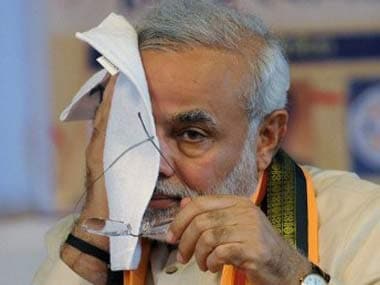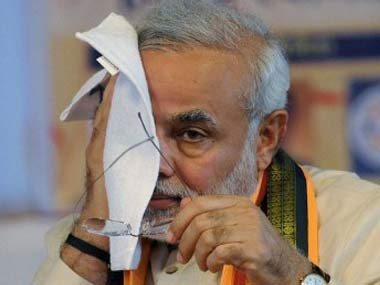By Gouri Chatterjee First the good news. Arun Jaitley, our finance minister, who is also the nation’s information and broadcasting minister and a legal eagle to boot, appears to hold the public intellectual in as high a regard as his bête noire Romila Thapar, providing them with as central a position as she does. Thapar, who is not only a leading light of the 50-odd historians who have come out strongly against the “climate of hate” prevailing in the country, has also, almost at the same time, come out with a book on The Public Intellectual in India, in which she delineates the vital role such people play in society by questioning the powers-that-be on behalf of the common man. “Today, as always,” she writes, “the public intellectual is expected to take a position independent of those in power, enabling him or her to question debatable ideas, irrespective of who propagates them. Reasoned critiques are often the essential starting point.” [caption id=“attachment_2487650” align=“alignleft” width=“380”]
 Prime Minister Narendra Modi. AFP[/caption] Arun Jaitley, with his angry fulminations against this very questioning, appears to indicate that he too believes they matter. Why else would he froth at the mouth at their “manufactured rebellion” and rave and rant that they are practicing “ideological intolerance” towards the BJP and the Prime Minister? What does it matter what a few hundred people say in a country of more than a billion, why should he care if they are, as he says, “playing politics by other means” when he and his party have such a humongous majority on their side? His tacit admission is: intellectuals do play a role in shaping opinions, in moulding views. Narendra Modi has never had much time for civil society, whether as Gujarat chief minister or as Prime Minister. Unlike, say, West Bengal chief minister Mamata Banerjee who consciously wooed the intelligentsia before the elections and still courts them assiduously. Instead, the BJP in Delhi has seemed determined to put intellectuals in their place by appointing ridiculously unsuitable candidates as heads of institutions like the Indian Council of Historical Research or the Film and Television Institute of India. Yet, his ministers and party spokespersons were quick off the mark ridiculing, denigrating, belittling the return of awards by a handful of people acting in their individual capacity. Never before has a movement begun so unassumingly. A couple of ageing and barely remembered writers declare they are returning their Sahitya Akademi awards as a mark of protest against the growing intolerance in the country which neither the literary body that should look after their interests, the Sahitya Akademi, nor the government seemed to care about. Helpless rage marked their protest, it was a purely personal and spontaneous act, an illogical decision because the Sahitya Akademi is an autonomous body, not a direct arm of the government, and the awards were given long before the present dispensation in Delhi came to power. But logic alone does not make the world go round. Emotions often trump reason and so it was in this case too. One by one, writers stood up to be counted, not too many, not the biggest guns either, but a movement had begun. And not just an award-wapsi movement either. Evidently they had touched a chord. Filmmakers, historians, scientists, ratings agencies like Moody’s and businessmen like Infosys chairman Narayana Murthy, Nobel laureate Kailash Satyarthi, the Sahitya Akademi as a body, even the President followed suit. It was now beyond awards. Whether awards were returned or not, the question had been raised: are we really in danger of turning into a bigoted, intolerant, fanatical society? Now for the sad news. The government, it seems, is determined to prove its critics right. Instead of lending a friendly ear, trying to allay their anguish, the Modi government and the ruling Bharatiya Janata Party is bent on confrontation. They will not stoop to conquer. As if accommodation of an opposing point of view would be a sign of weakness that a macho government cannot countenance. Rather, a counter-protest is being planned in Delhi on 7 November, a day before the Bihar results. A number of “nationalist minded” artistes, film personalities and writers have announced a campaign called ‘Jawab Doh’ to question those who have chosen to return their awards now instead of earlier and will involve a march from the India Gate lawns to Rashtrapati Bhavan, after which a memorandum is expected to be submitted to President Pranab Mukherjee. Even home minister Rajnath Singh, in trying to sound a less acerbic note, advised, “It will be better if you people seek an appointment with PM Modi and apprise him of the factors giving rise to intolerance and offer suggestions to contain the same.” No suggestion that the government could call for such a meeting and calm troubled waters. After all, they live by words, so words would go a long way in assuaging hurt feelings of the intellectuals.
Prime Minister Narendra Modi. AFP[/caption] Arun Jaitley, with his angry fulminations against this very questioning, appears to indicate that he too believes they matter. Why else would he froth at the mouth at their “manufactured rebellion” and rave and rant that they are practicing “ideological intolerance” towards the BJP and the Prime Minister? What does it matter what a few hundred people say in a country of more than a billion, why should he care if they are, as he says, “playing politics by other means” when he and his party have such a humongous majority on their side? His tacit admission is: intellectuals do play a role in shaping opinions, in moulding views. Narendra Modi has never had much time for civil society, whether as Gujarat chief minister or as Prime Minister. Unlike, say, West Bengal chief minister Mamata Banerjee who consciously wooed the intelligentsia before the elections and still courts them assiduously. Instead, the BJP in Delhi has seemed determined to put intellectuals in their place by appointing ridiculously unsuitable candidates as heads of institutions like the Indian Council of Historical Research or the Film and Television Institute of India. Yet, his ministers and party spokespersons were quick off the mark ridiculing, denigrating, belittling the return of awards by a handful of people acting in their individual capacity. Never before has a movement begun so unassumingly. A couple of ageing and barely remembered writers declare they are returning their Sahitya Akademi awards as a mark of protest against the growing intolerance in the country which neither the literary body that should look after their interests, the Sahitya Akademi, nor the government seemed to care about. Helpless rage marked their protest, it was a purely personal and spontaneous act, an illogical decision because the Sahitya Akademi is an autonomous body, not a direct arm of the government, and the awards were given long before the present dispensation in Delhi came to power. But logic alone does not make the world go round. Emotions often trump reason and so it was in this case too. One by one, writers stood up to be counted, not too many, not the biggest guns either, but a movement had begun. And not just an award-wapsi movement either. Evidently they had touched a chord. Filmmakers, historians, scientists, ratings agencies like Moody’s and businessmen like Infosys chairman Narayana Murthy, Nobel laureate Kailash Satyarthi, the Sahitya Akademi as a body, even the President followed suit. It was now beyond awards. Whether awards were returned or not, the question had been raised: are we really in danger of turning into a bigoted, intolerant, fanatical society? Now for the sad news. The government, it seems, is determined to prove its critics right. Instead of lending a friendly ear, trying to allay their anguish, the Modi government and the ruling Bharatiya Janata Party is bent on confrontation. They will not stoop to conquer. As if accommodation of an opposing point of view would be a sign of weakness that a macho government cannot countenance. Rather, a counter-protest is being planned in Delhi on 7 November, a day before the Bihar results. A number of “nationalist minded” artistes, film personalities and writers have announced a campaign called ‘Jawab Doh’ to question those who have chosen to return their awards now instead of earlier and will involve a march from the India Gate lawns to Rashtrapati Bhavan, after which a memorandum is expected to be submitted to President Pranab Mukherjee. Even home minister Rajnath Singh, in trying to sound a less acerbic note, advised, “It will be better if you people seek an appointment with PM Modi and apprise him of the factors giving rise to intolerance and offer suggestions to contain the same.” No suggestion that the government could call for such a meeting and calm troubled waters. After all, they live by words, so words would go a long way in assuaging hurt feelings of the intellectuals.
‘Jawab Doh’ is not the answer to AwardVapsi: Why the Modi government should stoop to conquer public intellectuals
FP Archives
• November 2, 2015, 12:56:44 IST
The government, it seems, is determined to prove its critics right. Instead of lending a friendly ear, trying to allay their anguish, the Modi government and the ruling Bharatiya Janata Party is bent on confrontation.
Advertisement
)